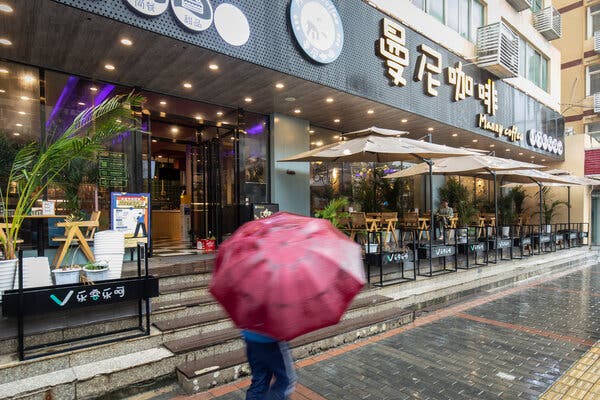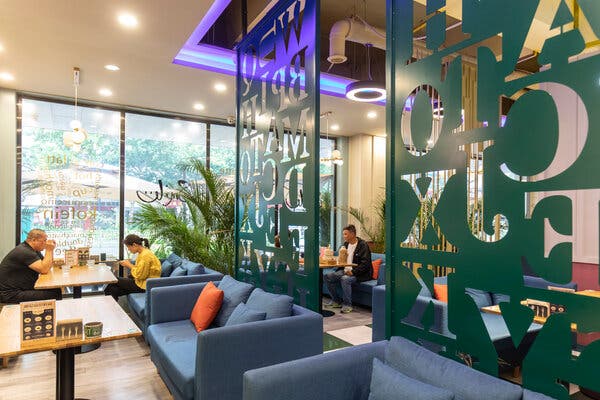Hamartia Antidote
ELITE MEMBER

- Joined
- Nov 17, 2013
- Messages
- 35,183
- Reaction score
- 30
- Country
- Location

She Rose From Poverty as China Prospered. Then It Made Her Poor Again.
Sun Junli is one of many small-business owners, the backbone of China’s economy, who lost everything to a change in government policy.

Sun Junli, who founded and built Manny Coffee into a business with 20 cafes, at one of the branches under new owners in Xianyang, China.
Two years ago, as she walked through a hospital hallway in handcuffs and shackles to get tested for Covid, Sun Junli felt ashamed and defeated. At 45, she had come a long way. The poor village girl in northwestern China had become a successful businesswoman.
Then she was crushed.
In 2018, state-owned banks abruptly stopped lending to her business, a chain of cafe restaurants, and the pandemic destroyed her cash flow. By May 2021, Ms. Sun had lost her restaurants, and she was serving 16 days in detention for owing her employees about $28,000 in wages.
Weeks after her release, a court would seize her two-bedroom apartment in Xianyang in Shaanxi Province and her Toyota Camry because she was insolvent, and put her on a national blacklist. She can no longer book a hotel room or a plane ticket, or take out a loan.
“I’m surrounded by people like me,” she said, counting dozens of friends in dire straits, entrepreneurs in fields like fashion, energy and furniture manufacturing. “We all came from nothing and worked hard to create wealth,” Ms. Sun said. “We all lost everything and are deeply in debt.”
“Are we all bad at what we do?” she asked. “Are we all wrong?”
A few years ago, Ms. Sun was the epitome of how small-business owners, through hard work, killer instinct and luck, became the backbone of the economy.
Now she illustrates something very different: how China, under the leadership of Xi Jinping, killed the animal spirits of the entrepreneur class as it asserted more state control of the economy. Mr. Xi’s government has withdrawn help when business owners needed it the most, punished them for their risk-taking and failures, and made it nearly impossible for them to start over.

The Manny Coffee in Xianyang. “We all came from nothing and worked hard to create wealth,” Ms. Sun said, describing herself and dozens of friends
The Chinese authorities like to call small businesses the capillaries of the economy. But years of capricious government policies, crackdowns and blacklisting have left firms battered or destroyed.
In 2021, when China was heralding its success in fighting the pandemic, the number of small firms that shut their doors outnumbered those that opened, Zeng Xiangquan, a professor at Renmin University in Beijing, told an official newspaper.
Business confidence is still hurting, one reason that China is in an economic quagmire. Small businesses make up about 95 percent of China’s private sector, which contributes about 50 percent of national tax revenue, 60 percent of economic output and 80 percent of new jobs.
Ms. Sun’s career began in the 1990s. After dropping out of high school at 17 to support her family, she worked as a farmer, a textile worker, a street food vendor and a taxi driver. Then in Hancheng, a city of about 400,000 people near her village, she opened three sportswear stores that sold Nike, Adidas and the Chinese brand Anta. It was 2008, the year China held its first Olympic Games, a coming-out party for an emerging power. She would make what she called her “first bucket of gold.”
In 2013, when e-commerce began to affect retail businesses, Ms. Sun opened Manny Coffee, a 4,000-square-foot cafe in Hancheng. It sold coffee, steak, pizza and other Western-style food and drinks, a novelty in the city. By 2018, she had expanded to 20 branches in six smaller cities in Shaanxi Province.
When she had started out years earlier, Chinese banks were reluctant to lend to the private sector. Around 2015, given competition from online financial institutions such as Ant Group, regulators instructed banks to lend more to small businesses
Banks chased after Ms. Sun, who borrowed $1.3 million to expand and build a central production kitchen for her restaurants. But the credit dried up suddenly in 2018. The regulators, worried about debt, issued new guidelines telling banks to “pay attention to the quality of loans to small businesses.”
The abrupt change bruised many companies. The fallout got so bad that regulators started to investigate the “irrational practices” of banks.
But it was too late for Ms. Sun. In October 2019, she borrowed money from family and friends to pay back her last bank loan, about $300,000. Her restaurants were doing well — revenue reached $8 million in 2018. She was confident that the Chinese New Year in January 2020 would bring in healthy cash flows.
On the eve of the holiday, all her branches were shut as the coronavirus began to spread fast. The shutdown was lifted after three months, but her business never recovered. To pay rent and wages, Ms. Sun borrowed more from people close to her and maxed out her credit cards. Every month, she believed that the next month would be better. The government offered no help.
By November 2020, she was $1.5 million in debt and couldn’t keep going. She shut the six restaurants she owned outright and gave up a 70 percent ownership she had in the 14 others, and in exchange her minority shareholders agreed to pay rent and wages.
China doesn’t really allow for bankruptcy, which in other countries can allow business owners to work out the money they owe.
Ms. Sun owed six weeks of wages to her 31 employees. The employees reported her to the local labor inspection agency, which handed her to the police.
During her 16 days in the detention center, her hair went gray. She spent most time meditating. The police didn’t release her until their investigation confirmed that she hadn’t hidden any assets. A year later, the court would find “no criminal facts” against her, according to a court document. But she had lost her business and her reputation.
Ms. Sun tried to make a living by helping to manage the 12 Manny Coffee branches that were still in operation. But she had little work and income in 2022 because of China’s draconian “zero Covid” measures. The apartment complex where she rents was locked down eight times. Her brother, who delivered meals, sometimes gave her money and brought her food.
Her father, who had lung cancer and had become infected with Covid, died on Dec. 25, 2022. It was her birthday. She turned 47.
Like many Chinese, Ms. Sun thought business would bounce back in 2023 after Covid restrictions were dropped. But it didn’t.
To make a living, she is trying to start a new food business. In the economic downturn, she figures, her former customers might not want to pay $15 for steak, but they might buy a bowl of spicy vegetables for $4.
She said she didn’t expect any financial support from the government. But she’d like to get off the blacklist she was added to in 2021.
The so-called dishonest persons list was started in July 2013, a few months after Mr. Xi took power. It had eight million people on it in March. Many business owners got swept onto the list, including the founders of at least 22 of the top 500 private enterprises in China, according to Chinese media reports.
“I’m not asking them to give me money,” Ms. Sun said. “But I’d really like them to get my name off the blacklist so I can become a normal person and start a business again.”
“I can’t fly if I want to go to Shanghai,” she said. “I can’t take the high-speed train. I can’t travel. In a way, it’s no different from locking me down at home.”

The Manny Coffee is one of 12 remaining branches. Ms. Sun now wants to start a new food business




